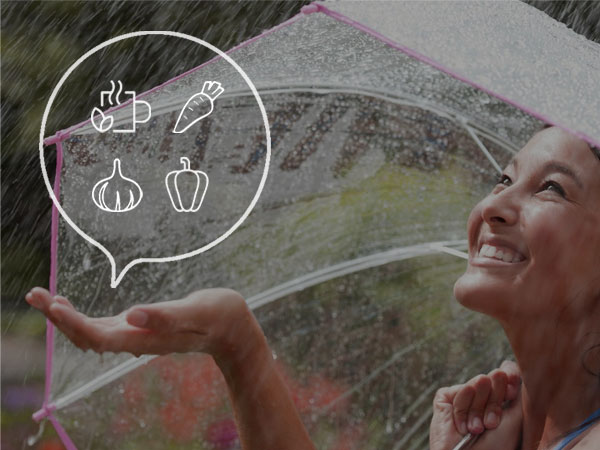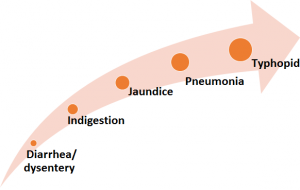After living through the hot summer months, the most awaited spell of rain brings in relaxing and soothing smile on everyone’s face. Now gradually heat waves are interchanged by cooling showers. Consequently, the humidity level goes up & the digestive ability of the body tumbles down. Monsoons can have bad impact on health if proper precautions are not taken as it reduces the immunity of the body. Foods play a very important role in this season too.
Wrong foods that have been contaminated with pathogens such as E.coli, Salmonella or Campylobacter, can cause food-borne illness. The irresistible urge to eat road side hot, crispy, deep-fried snacks viz. pakoras, samosas, vadas, etc. makes you a victim of various infections. It’s noteworthy that food and waterborne gastrointestinal infections are widely spread among masses, during this changing wet season. Raw or undercooked food infected with certain bacteria, virus or parasites cause food poisoning that is carried or transmitted to humans by contaminated foods or beverages. That’s why during rainy season, hygiene and sanitation must be put into practice to fight against all ailments.
When it’s pouring outdoors as far as one elects to choose homemade, hot delicacies nothing will happen in terms of food related disorders. A monsoon diet mainly involves eating safe, wholesome foods & modifying dietary habits.
Following are some useful points to ponder during monsoon for staying safe from infections and healthy:
- Wash hands at all times after visiting the toilet, before eating and handling with food in any form.
- Throw out decayed food, which has a strange odour or mould.
- Stay away from mosquitoes, flies, cockroaches, termites etc. by periodic use of insect repellents & disinfectants.
- Diabetic people should keep their feet completely dry to prevent fungal infections.
- Women should take care of personal hygiene to avoid UTI or any other vaginal infections. Avoid using wet undergarments. The inner wear must be used after ironing.
- Kitchen worktops, napkins/ mops, chopping boards & utensil cleaning sponge should be thoroughly clean, disinfected & dried to avoid growth of microbes.
7. Dietary approach:
- Segregate raw and cooked foods both – when preparing and storing.
- Keep fully covered all eatables, cooked and uncooked vegetables.
- Include food items that have high anti-oxidants like garlic, green tea, bell peppers, broccoli, carrots and barley.
- Eat only well-cooked, fresh & hot meals.
- Drink boiled and purified water only. Carry bottle if moving outside.
- Avoid eating leftover food or stale food.
- Have seasonal fruits & vegetables immediately after cutting them yourself.
|
Foodstuffs to Avoid |
|
|
Salty oily/ deep fried foodstuff |
|
|
Raw foods |
|
|
Leafy vegetables (Spinach, Cabbage, Cauliflower, Fenugreek leaves (Methi) etc.) |
|
|
Fruit/ vegetable juices |
|
|
Dairy products (milk, cheese, paneer, etc) |
|







,